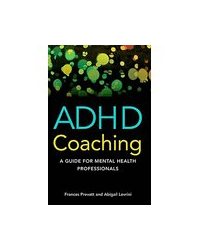“ADHD Coaching: A Guide for Mental Health Professionals”

“ADHD Coaching: A Guide for Mental Health Professionals”
By Frances Prevatt and Abigail Levrini
American Psychological Association
Washington, D.C., 2015
ADHD guide contains invaluable tools
Reviewed by James K. Luiselli, Ed.D, ABPP, BCBA-D
Coaching interventions have become popular in recent years. Terms synonymous with coaching are behavioral skills training, competency-based intervention and action-oriented methodologies.
In this highly laudable book, psychologists Frances Prevatt and Abigail Levrini address theory, knowledge and strategies “that will help mental health practitioners to develop or improve their ADHD coaching skills.”
The book begins by highlighting several recent developments in assessing and treating ADHD, including revised DSM-5 diagnostic criteria, advances in neurobiological factors contributing to ADHD and the current status of psychopharmacology.
In addition, the authors detail developmental differences in ADHD presentation among children, adolescents and adults. These early chapters are thorough and a solid reference for students and professionals new to ADHD.
The authors also explain the foundations of ADHD coaching before explicating specific procedures. They write that ADHD coaching is “an intervention that complements medication and other non-pharmacological alternatives,” heavily influenced by cognitive behavioral therapy, problem solving therapy and organizational skills training.
These fundamental strategies extend further to areas such as managing finances, maintaining a healthy lifestyle (nutrition, sleep, exercise) and succeeding at school and on the job.
Prevatt and Levrini constructed the book according to specialization services they provide for high school students, college students and adults with ADHD.
These clients also struggle with co-occurring learning disabilities and mental health concerns. Several “nuts and bolts” chapters describe many of the methods comprising their ADHD program, with emphasis on CBT, psychoeducation and techniques to improve executive functioning.
In advising ADHD coaches, the authors stress teaching clients how to follow a problem solving model in which they define critical life issues, set forth behavior-change objectives, propose intervention options, implement solution, and evaluate outcome. Consider some of the other coaching “rules of thumb” which the authors review:
- Assess a person’s self-determination for change before intervening.
- Identify personal sources of motivation, both internal and external.
- Expect resistance to change, particularly at the onset of training.
- Help clients select reasonable life goals that can be approached gradually.
- Teach practical methods of progress monitoring.
- Integrate contemporary technology via graphic organizers, digital planners and smartphone applications.
To best exemplify these and other coaching tactics, Prevatt and Levrini conclude the book with five extended case studies, each one specific to a client with ADHD: middle age adult, young professional adult, college student with executive functioning deficits, young adult with comorbid mood disorder and adolescent. These cases walk the reader through all of the assessment, planning, intervention and evaluation guidelines that were introduced in earlier chapters.
Finally, the book’s practical sensibility is evident with a rich sampling of clinical forms used for setting goals, charting progress, compiling session-to-session notes, documenting need areas and conducting interviews.
Busy practitioners will find these and other similar documents contained in the book invaluable tools that economize time without sacrificing clinical rigor.
My review leads to a firm conclusion: this book is one of the best guides available to any mental health professional specializing in ADHD. Notably, the research base supporting ADHD coaching continues to grow and is accurately represented within every chapter in the book. Trainees and professionals at all levels of expertise would do well to have it at hand!
I note that Prevatt and Levrini are careful to point out that their book should be combined with supervised clinical experience, regular access to the peer-reviewed literature and attendance at workshops and conferences.
My guess is that “ADHD Coaching” will quickly become a seminal resource that advances effective practice standards now and for years to come.
James K. Luiselli, Ed.D., ABPP, BCBA-D, is Chief Clinical Officer, Clinical Solutions, Inc. and North East Educational and Developmental Support Center, Tewksbury, Mass..
Learn more about the book: ADHD Coaching: A Guide for Mental Health Professionals
